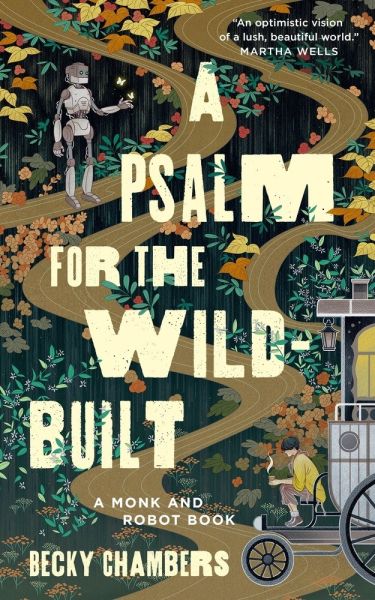Some Other Time
A Psalm for the Wild-Built (Robot and Monk)
By Becky Chambers

17 Feb, 2022
2021’s A Psalm for the Wild-Built is the first volume of Becky Chambers’ Robot and Monk series.
Although Panga’s only city (named City) is a fine city, it has no crickets. Sibling Dex wants to hear crickets. They leave urban monastic life behind to embrace the way of the tea monk. Learning how to be a proper tea monk will be just one delightful aspect of this new life.
There is, however, the matter of the rogue robots.
For reasons still mysterious, the Factory Age came to an abrupt halt when robots became self-aware. Determined to find their own way, the robots left humans behind, migrating out into the Wild. By mutual agreement, humans left the robots and their wilderness territory alone while leaving open the option of robots rejoining human society should they ever chose to do so. It has been centuries since the robots left and thus far no robot has ever contacted humanity.
There are many villages near the City. Thanks to the ecological excesses of the Factory Age, these communities also lack crickets. The world’s ecologies have recovered since the Transition, but crickets are still effectively unknown in that part of Panga in which biological people live. Sibling Dex’s quest for crickets cannot succeed unless he embraces a bold strategy.
Dex sets out for Hart’s Brow, an isolated, long disused hermitage deep in the wilderness. In the ancient past, Hart’s Brow abounded in cloud crickets. Perhaps it still does!
There is a lot of untamed wilderness between Dex and their destination. Long before Dex reaches whatever remains of Hart’s Brow, they encounter Splendid Speckled Mosscap, a robot far more experienced in matters Wild than Dex. A robot keenly inquisitive about biological people like Dex.
~oOo~
This world has twenty-hour days so either hours are different or this is not Earth. It follows that the biological entities in this story may not be humans. They appear to be functionally indistinguishable from humans.
The robots, on the other hand, are very definitely robots. One might wonder where they get the parts for new robots, living as they do in the wilderness. The answer appears to be “from old robots.” While the robots have the potential to last forever if they could access and install spare parts, they choose for philosophical reasons to reject immortality. A broken robot accepts disassembly. New robots are created from the parts of the old [1].
This is a stupendously amiable book. There are no burnings of heretics, no continental-shelf-collapses, and no angry mobs blocking vital transportation bottlenecks. Dex, whose job it is to minister to the emotionally troubled, does not solve even one murder over the course of the novel. Nor does Mosscap at any point rend Dex limb from limb while chanting “crush, kill, destroy!” Basically, this book breaks all the basic laws of the SF genre.
Older readers may be reminded of some of Clifford D. Simak’s more amiable rustic futures, in which the world is mostly untouched wilderness and humans are essentially decent people able to commit to the greater good and disregard their own short-term advantage. Mosscap would find much to discuss with City’s Jenkins or the machines who populate Project Pope. In short, it’s a tremendously good-natured novel in which two strangers attempt to better know each other. Nothing to do with the real world, of course, but comforting to read.
A Psalm for the Wild-Built is available here (Amazon US), here (Amazon Canada), here (Amazon UK), here (Barnes & Noble), here (Book Depository), and here (Chapters-Indigo).
1: Either the robots have a parts factory tucked away somewhere or this is a Becky Chambers novel and basic thermodynamics does not apply.
My editor points out a possibility I overlooked: a slow decline to extinction as parts wear out or break and cannot be replaced. It may take two or more older robots to make one new one. No doubt further installments will explain this process.
